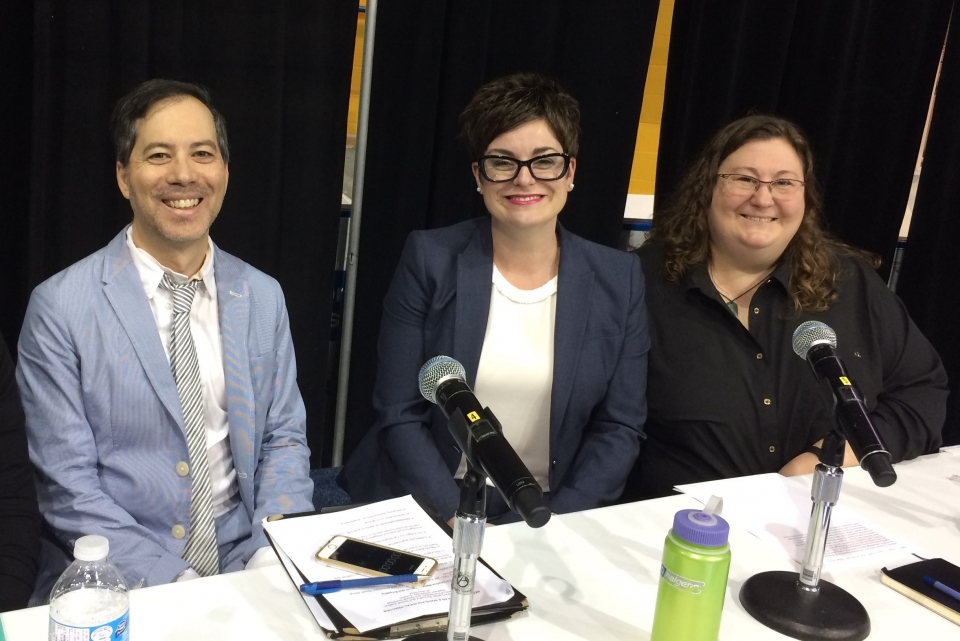The Congress of the Humanities and Social Sciences brings together leading thinkers, academics, researchers, policy-makers and innovators to explore some of the world’s most challenging issues. Congress celebrates the vitality and quality of Canadian research contributions, and helps train the next generation of Canadian ideas leadership. This year’s theme “The Next 150, on Indigenous Lands" celebrates the history, legacy and achievements of the peoples and territories that make us who we are, and anticipates the boundless opportunities of the future. Organized by the Federation for the Humanities and Social Sciences, this year’s Congress is being hosted by Ryerson University in Toronto from May 27-June 2. Follow this series of Big Picture at #congressh blogs.
According to the panelists at a Congress session called “On Indigenous lands: Empathy and social justice,” the formation and findings of the Truth and Reconciliation Commission of Canada constitute just the first and very incomplete step in addressing the injustices that plague Canada both past and present.
For Professor Joanna Quinn (Western University), reconciliation is the intersection of empathy and justice and the discovery or rediscovery of facts surrounding gross abuses of human rights. However, past examples show that societies emerging from such trauma aren’t immediately open to truth commissions, but are usually reticent if not openly hostile to such processes. How then can people be made to care about uncovering these truths and about what others have suffered? According to Quinn, the “soil” of post-conflict society needs to be “amended” for reconciliation and transitional justice through what she terms “thin sympathy” for the other: a basic understanding of how the other lives, what happened to them, and a simple acknowledgment of their humanity. However, thin sympathy is just the leading edge of understanding, the initial move toward generating “thick sympathy” and eventual empathy. The reconciliation process requires at least thin sympathy among outsiders and bystanders, and without a combination of empathetic champions and at least thin sympathy at a critical mass in the general population, reconciliation cannot succeed.
As an Indigenous academic and a constitutional scholar, Professor Kiera Ladner (University of Manitoba) brought unique and deep insight to the panel. She pointed out that reconciliation needs to move beyond empathy to concrete action. While current reconciliation programs in countries like Canada and Australia—where Ladner has worked for the last seven years on constitutional reform—focus on relatively narrow elements of endemic injustice, these efforts need to be refocused on the issues that really matter to Indigenous peoples: land, sovereignty and self-determination. According to Ladner, Indigenous peoples don’t want “one big hug” as part of a nation building process. Instead, the very notion of the “Aboriginal problem” needs to be flipped on its head: it is not an issue of Indigenous peoples needing to reconcile with Canada, but an issue of non-Indigenous Canadians needing to learn our nation’s true history and find out what it means to live on Indigenous lands. All Canadians need a greater understanding of Indigenous law and what it means to live under treaty law and as a treaty people.
Sociologist that he is, Professor Fuyuki Kurasawa (York University) proposed a taxonomy of three tasks in reconciliation: remembrance and commemoration, acceptance and assuming responsibility, and justice as a process of decolonization. He also pointed out that the process of reconciliation here in Canada is collectively asymmetrical. Non-Indigenous Canadians cannot determine if reconciliation has been achieved or demand that Indigenous peoples accept it: this right must be ceded to the victims of systemic injustice and violence. He pointed out that reconciliation is a relational, ongoing process that always has the potential to fail, and that there are no shortcuts or half-measures.
All three panelists pointed out that understanding and education are important first steps in the path to reconciliation and reform, but they remain first steps only. Real change can only take place when justice is brought forth through concrete measures.
Professors Joanna Quinn, Kiera Ladner and Fuyuki Kurasawa participated in a panel discussion entitled On Indigenous lands: Empathy and social justice at Congress 2017 at Ryerson University, and hosted by the College of New Scholars, Artists and Scientists at the Royal Society of Canada.

